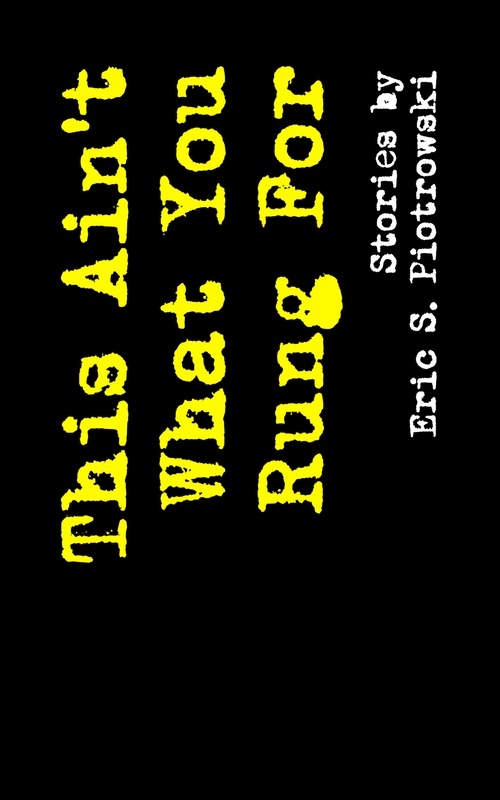
About JT and ESP
Eric S. Piotrowski is a writer and high school English teacher. He also makes electronic music, designs websites, and hosts a podcast about economics and killer robots. He is a lifelong political agitator, and suffers from a chronic addiction to video games. He lives with his wife and dog in Wisconsin.
 I've been writing fiction since I was ten years old. At first it was just ripoffs of science fiction movies, and then I began mimicking my favorite fantasy authors (David Eddings and Roger Zelazny were at the top of the list). When I was twelve I began writing a fantasy novel, and later mixed SF elements into the sequels. I finished writing these in college, but they're still not as good as they should be. Someday I will subdue them until they are in a condition wherein their consumption by other humans will not fill me with shame and regret.
I've been writing fiction since I was ten years old. At first it was just ripoffs of science fiction movies, and then I began mimicking my favorite fantasy authors (David Eddings and Roger Zelazny were at the top of the list). When I was twelve I began writing a fantasy novel, and later mixed SF elements into the sequels. I finished writing these in college, but they're still not as good as they should be. Someday I will subdue them until they are in a condition wherein their consumption by other humans will not fill me with shame and regret.
I've also written a lot of short stories. In college I specialized in weird, disturbing mutant tales with jagged narrative structures. I had fun venting the shocking corners of my twisted imagination (excuse me as I roll my eyes Liz-Lemon-style at my nineteen-year-old self), but I soon realized these stories didn't really matter.
Perhaps due to my daily interactions with (a few) young people who paid close attention to my words, I began to work on fiction that cut deeper and said something more substantial than "Look at how strange I am!" (I still enjoy writing weird stories, as you can see in The Fiction Journal. But longer fiction demands more substance.)
In a 1996 interview, David Foster Wallace said: "When you see students' work where the point — whether it's stated or not — is basically that they're clever, [you] try to articulate to the students how empty and frustrating it is for the reader to invest their time and attention in something and to feel the agenda is basically to show you that the writer's clever." As in This Is Water, Mr. Wallace makes a vital point in a beautiful way. That quote neatly summarizes the shift in my fiction around the onset of my teaching career.
The Writing Teacher Teaches Writing
In 2003 I began teaching creative writing at the high school level. This was (and continues to be) an interesting challenge, especially because it required me to systematize my understanding of how to write fiction well. Of course the best way to learn a thing is to teach it to others, and my own writing improved dramatically once I was given the task of showing others how to do it. (Every time I read to the kids from Elements of Style, I also remind myself to "remove needless words".)
The other change I've had to make is related to vulgarity. Of course realistic dialogue must reflect authentic patterns of human communication. At the same time, public school teachers are held to a high standard of decency, and I have enough pressures on my professional life without adding the scrutiny of conservative social forces inspecting my fiction. In "Respawn" I made a point of this, redacting words and phrases with thick black lines. Elsewhere I've tried to find a "third way" between authentically foul language and writing that is appropriate for the tender ears of young people.
Published At Last
 In 2013, after years of thrusting photocopied stories into the hands of my friends and colleagues, I collected a bunch of short stories into a volume called This Ain't What You Rung For. There's a stigma attached to self-publishing, and it's not unwarranted. Some of the worst books I've ever read have been published at the author's personal expense, probably because no publisher in their right mind would spend good money setting the type for such tripe.
In 2013, after years of thrusting photocopied stories into the hands of my friends and colleagues, I collected a bunch of short stories into a volume called This Ain't What You Rung For. There's a stigma attached to self-publishing, and it's not unwarranted. Some of the worst books I've ever read have been published at the author's personal expense, probably because no publisher in their right mind would spend good money setting the type for such tripe.
I will tell you that my writing is actually good, but what would you expect me to say? Others will have to judge such things. The reason I self-published my first book is simple laziness and impatience. I hate the idea of waiting two months to receive a rejection letter, shambling from faceless company to faceless company, pleading for someone to take me seriously as a writer. I'd much rather just print the stuff myself and give it to people who might be interested.
Besides, I'm a busy guy. As a teacher, my schedule from September to June is intense and exhausting. I do some writing during the school year, but between the papers I have to grade; the clubs I sponsor; the political organizations I work with; trying to keep sane with zazen and video games; and all the intimate vagaries of being a decent human, I simply don't have time or energy for begging publishers to read my stuff.
Besides, by doing it all myself, I have total control over the final product. Yes, this means that the shortcomings and typos will haunt me and I will be unable to blame anyone else for the bad bits. But the cover looks exactly as I want it to look, and I don't have to deal with annoying industry people.
In ten years I've self-published six books — and written many other things. Once in a while I get some recognition and virality. Mostly, though, it's obscurity. I'm blessed to have thoughtful, encouraging friends and loved ones. Still, I can't help feeling like Milhouse on The Simpsons.
I get angry and jealous when other writers get attention for their work, which is a sad manifestation of the ego. Still, it's frustrating to spend a decade earnestly soliciting the love of Legit Publishers, only to get ignored constantly with great vehemence. I'm lucky to have the readers I do have, I know, and I take great pride in the work itself. But I can't pretend I'm not aggravated by the "crap shoot" of publishing, as Terry Brooks calls it.
I keep hoping someone with access to lots of resources will read my work and say: "This is amazing! It's a disgrace that he hasn't been published yet. Let's print up 500,000 copies and send him on a worldwide book tour." I'll go on To The Best of Our Knowledge and Fresh Air and meet Tavis Smiley and Charlie Rose. People will buy me drinks and demand that I sign their books. Eventually I'll be featured on The Simpsons like Thomas Pynchon and Gore Vidal. That'll be sweet.
Search and Research
Once I finished graduate school, I realized that I quite enjoy research writing, so long as I can choose the topic. Because I considered it so important (and so few people knew the basics), I wrote a couple of pamphlets about international economics around the time of the Seattle WTO protests. I followed this in 2003 with a treatise called A Profit Without Honors: Against the Business Model of Education.
 In 2007 I began contributing to Wikipedia, specializing in the rewriting and revision of articles about important people (and copyediting — lots of copyediting). Before long I earned my first Featured Article, with the guidance of some magnificent editors who showed me the ropes. Today I have written thirteen FAs. (Of course there isn't just one author for these collaborations, but I wrote 80% to 90% of each article.)
In 2007 I began contributing to Wikipedia, specializing in the rewriting and revision of articles about important people (and copyediting — lots of copyediting). Before long I earned my first Featured Article, with the guidance of some magnificent editors who showed me the ropes. Today I have written thirteen FAs. (Of course there isn't just one author for these collaborations, but I wrote 80% to 90% of each article.)
In 2008 I was awarded the Imperial Napoleonic Triple Crown for "exceptional mainspace contributions" to Wikipedia, and I'm honored to have received various other tokens of appreciation. The best thing about working on Wikipedia is knowing that my work is helping others learn about important people like Harriet Tubman and Emma Goldman and Chinua Achebe. I don't work on Wikipedia much these days, but I may return at some point. (I did lots of research on the French novelist Honoré de Balzac, during which time I purchased 30 books about him. They're waiting for me to come out of research retirement.)
Writing And Living
As I wrote in Letter to a Young Writer, writing is for me a weird combination of passion, ecstasy, addiction, and liberation. I live much of my life among what John Gardiner's Grendel calls "meaningful patterns that do not exist". I hope that the time and energy I put into the relentless arrangement of these 26 letters will result in some small enlightenment and/or amusing diversion for other people.
Eric S. Piotrowski
March 2022